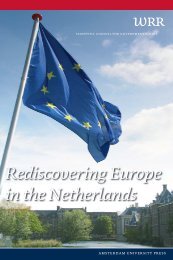The Western Condition - St Antony's College - University of Oxford
The Western Condition - St Antony's College - University of Oxford
The Western Condition - St Antony's College - University of Oxford
Create successful ePaper yourself
Turn your PDF publications into a flip-book with our unique Google optimized e-Paper software.
Faces <strong>of</strong> the West: Can Europeanisation, Americanisation and Autonomisation be reconciled?<br />
III. Faces <strong>of</strong> the West: Can Europeanisation, Americanisation<br />
and Autonomisation be reconciled?<br />
What then can we infer from contemporary politics in the Middle East regarding what we called<br />
at the outset <strong>of</strong> this paper ‘the <strong>Western</strong> condition’? In particular, what shapes perceptions and<br />
drives “western” decision makers on both sides <strong>of</strong> the Atlantic in their dealings with Turkey?<br />
While we cannot presume to generalise against such a fluid backdrop, something can be said<br />
already about change and continuity. For one, that it is still the case, and perhaps more than ever,<br />
that different geopolitical priorities, historical vantage points and experiences <strong>of</strong> socio-economic<br />
and cultural interaction with this country mean that the story <strong>of</strong> Turkey’s ties to the West is<br />
interpreted differently in Washington, Brussels or individual European capitals. Second, that with<br />
the exception <strong>of</strong> the few years between the late 1990s and mid-2000s, when Turkey’s EU<br />
membership ambitions dominated its political agenda, the United <strong>St</strong>ates has been at the centre <strong>of</strong><br />
Turkey’s engagement with the West, defining its main conceptual framework and dominant<br />
narrative. And third, that while Turkey’s attempt to define an autonomous foreign policy free <strong>of</strong><br />
western entanglements might seem to have failed, it might yet take on a new shape in the post-<br />
Arab spring configuration. In short, the challenge for Turkish policy today as we see it is now to<br />
reconcile the three variations which have characterised its foreign policy over the last decade,<br />
namely Europeanisation, Americanisation and the search for autonomy.<br />
<strong>The</strong> United <strong>St</strong>ates and the logic <strong>of</strong> strategy<br />
However contentious within the American body politic, sustaining US global influence continues<br />
to define American foreign policy, and has been the underlying theme <strong>of</strong> all its bilateral relations,<br />
including with Turkey since the beginning <strong>of</strong> the Cold War. 135 During that period, and rather<br />
unsurprisingly, prevailing narratives <strong>of</strong> freedom, democracy and liberty <strong>of</strong>ten gave way to<br />
geostrategic considerations in the conduct <strong>of</strong> policy. Turkey was no exception. Indeed, it could<br />
be argued that its status <strong>of</strong> “America’s closest ally” in the region along with Israel all but<br />
reinforced the authoritarian and patriarchal tendencies <strong>of</strong> the Turkish state in the last half<br />
century. During the Cold War, the terms <strong>of</strong> Ankara’s engagement with the US and Europe, as<br />
well as the dominant narrative <strong>of</strong> Turkey’s identity as a ‘western’ country, was determined by its<br />
membership in the US-led western security alliance and its key geostrategic role as a frontier state<br />
135 See Joshua W. Walker ‘<strong>The</strong> Forming <strong>of</strong> the US-Turkish Special Relationship’, in Nur Bilge Criss, Selçuk Esenbel,<br />
Tony Greenwood and Louis Mazzari, American Turkish Encounters: Politics and Culture, 1830 – 1989 (Cambridge, UK:<br />
Cambridge Scholars Press, 2011); and F. <strong>St</strong>ephen Larrabee, Troubled Partnership: U.S. – Turkish Relations in an Era <strong>of</strong><br />
Global Geopolitical Change (Santa Monica, CA: RAND Corporation, 2010).<br />
50

















